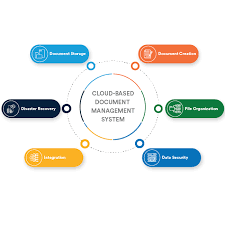Unlocking Efficiency: The Power of a Cloud-Based Document Management System
The Benefits of a Cloud-Based Document Management System
In today’s digital age, managing documents efficiently is crucial for businesses of all sizes. A cloud-based document management system offers numerous advantages over traditional paper-based systems. Let’s explore some of the key benefits:
Accessibility and Collaboration
One of the primary advantages of a cloud-based document management system is the ability to access documents from anywhere with an internet connection. This enables employees to collaborate in real-time, regardless of their location. Team members can work on documents simultaneously, increasing productivity and efficiency.
Cost-Effectiveness
Implementing a cloud-based document management system eliminates the need for physical storage space and reduces costs associated with printing, paper, and manual filing systems. Businesses can save money on infrastructure maintenance and streamline their document management processes.
Security and Data Backup
Cloud-based document management systems offer enhanced security features such as encryption, access controls, and audit trails to protect sensitive information. Additionally, data stored in the cloud is automatically backed up, reducing the risk of data loss due to hardware failures or disasters.
Scalability and Flexibility
Cloud-based document management systems are highly scalable, allowing businesses to easily adjust storage capacity based on their needs. As businesses grow, they can expand their storage space without investing in additional hardware or software upgrades.
Compliance and Regulatory Requirements
Many industries have strict compliance requirements regarding document retention and security. A cloud-based document management system helps businesses meet regulatory standards by providing secure storage, version control, and audit capabilities.
Conclusion
A cloud-based document management system offers a wide range of benefits that can significantly improve efficiency, collaboration, security, and compliance within an organization. By leveraging the power of cloud technology, businesses can streamline their document management processes and focus on driving growth and innovation.
5 Essential Tips for Optimizing Your Cloud-Based Document Management System
- Ensure proper access controls are in place to protect sensitive information.
- Regularly back up your documents to prevent data loss.
- Utilize version control features to track changes and revisions.
- Train employees on how to effectively use the document management system.
- Integrate with other tools and applications for seamless workflow management.
Ensure proper access controls are in place to protect sensitive information.
It is crucial to ensure proper access controls are in place when implementing a cloud-based document management system to safeguard sensitive information. By setting up granular permissions and user roles, businesses can control who has access to specific documents and prevent unauthorized users from viewing or editing sensitive data. This security measure helps mitigate the risk of data breaches and ensures that confidential information remains protected at all times.
Regularly back up your documents to prevent data loss.
Regularly backing up your documents is a crucial practice to prevent data loss when using a cloud-based document management system. By creating backups at scheduled intervals, you ensure that even in the event of unexpected issues like system failures or accidental deletions, your important files are safe and easily recoverable. This proactive approach not only safeguards your data but also provides peace of mind knowing that your information is secure and accessible whenever needed.
Utilize version control features to track changes and revisions.
Utilizing version control features in a cloud-based document management system is essential for tracking changes and revisions effectively. By maintaining a history of document versions, users can easily review previous iterations, identify modifications, and revert to earlier versions if needed. This feature enhances collaboration among team members, ensures data integrity, and streamlines the document editing process by providing a clear audit trail of all changes made to the document.
Train employees on how to effectively use the document management system.
Training employees on how to effectively use the cloud-based document management system is crucial for maximizing its benefits. By providing comprehensive training sessions, employees can learn how to navigate the system efficiently, collaborate with colleagues, maintain data security, and adhere to compliance regulations. Investing in employee training ensures that the organization can fully leverage the capabilities of the document management system, leading to improved productivity, streamlined workflows, and enhanced data management practices.
Integrate with other tools and applications for seamless workflow management.
Integrating a cloud-based document management system with other tools and applications is essential for ensuring a seamless workflow management process. By connecting your document management system with other software solutions such as project management tools, communication platforms, and CRM systems, you can streamline processes, enhance collaboration, and improve overall efficiency. This integration allows for easy access to documents across different platforms, eliminates silos between systems, and creates a more cohesive work environment where information flows smoothly between various tools, ultimately boosting productivity and driving better results.





